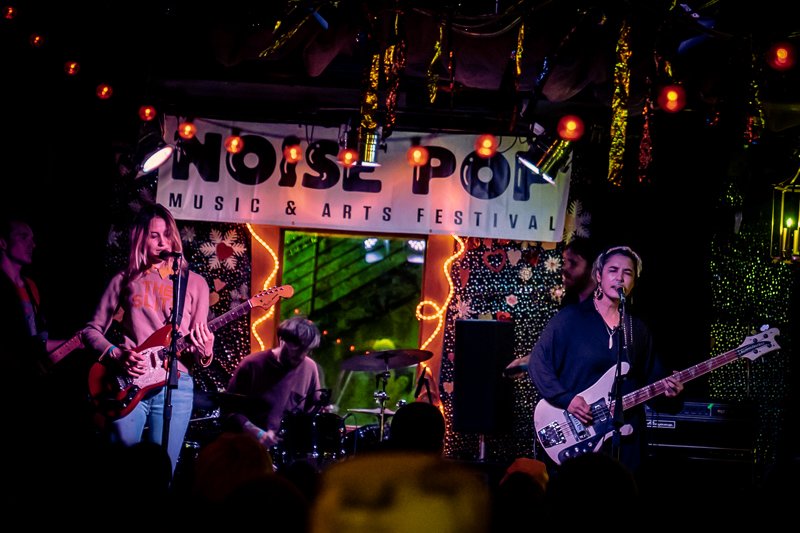Looking Back on Noise Pop Festival 30 Years Later With Founder Kevin Arnold
THE MUSIC INDUSTRY INCHES CLOSER AND CLOSER — to the springtime, arguably the kickoff of music festival season. April is now known as the month of Coachella, a festival titan, preceded by the multi-industry South by Southwest (SXSW) in March. But in the Bay Area — more specifically San Francisco — natives will know February as the month of Noise Pop Festival, which returns next week to celebrate its 30th anniversary.
This year, Yo La Tengo, Duster, and Boy Harsher headline the festival, in which they will play The Fillmore, The Regency Ballroom, and 1015 Folsom, respectively, on different nights of the week. Aside from the other 100 or so artists on the bill, the festival is accompanied by a film component, comedy shows, pre-parties, and bar takeovers around the city.
Noise Pop Industries is the leading event producer and promoter of the Bay Area and the parent of Noise Pop Festival, which gets its name from the noise pop subgenre pioneered by the likes of Hüsker Dü and The Replacements. But the person who gave Noise Pop Industries its name was founder Kevin Arnold in 1993. Before Noise Pop was a company — and before Arnold its founder — it was a one-night concert at the Kennel Club (now known as The Independent), and Arnold was an architecture graduate from University of California, Berkeley.
It was Jan. 29, 1993 — Nirvana was one of the biggest bands in the world, 1991: The Year Punk Broke made its theatrical debut just a month earlier, and the internet was a wink away from becoming public domain. Arnold was working as the booker and touring agent for Overwhelming Colorfast, a noisy punk band hailing from Antioch, CA, when the booker at Kennel Club reached out with an open slot. He booked four more bands alongside Overwhelming Colorfast — Bitchcraft, Carlos, Corduroy, and The Meices — made a poster, and sold 800 tickets at $5 a pop (today, the venue capacity is only 500).
“Noise Pop was started at this really big infraction point in popular music culture in general,” Arnold said. “There was this underground and label world of bands, zines, all of this stuff, and there was no internet. You had to be kind of plugged in to people and word-of-mouth channels and stuff to learn about shit.”
photo courtesy of Subodh Samaudre
San Francisco in 2023 is a radically new and borderline-unrecognizable environment. Since the fizzling out of Summer of Love–era rock, San Francisco has arguably never had one concrete genre to its name. At an even larger scale, indie music is booming and has splintered off into an array of genreless genres. Music-making has become more accessible to the public in an age where entertainment is one of the most sought-after industries to land a career.
The artists in the Bay Area don’t seem as concerned with becoming the next big thing, though it’s not a surprise when they do. South Bay’s Scowl and Drain are on the rise in the hardcore renaissance, the rise of post-punk inspires local outfits such as Pardoner and Fake Fruit; garage bands such as Outer Sunset, Thank You Come Again, and Juicebumps are garnering repertoire and support by the day.
Noise Pop Festival has gained a reputation for becoming the premiere festival in which many bands begin to get their footing (Death Cab for Cutie played as openers on a five-band bill in 1999, and Jimmy Eat World played in 2001 months before releasing Bleed American). However, the festival has never been a talent contest — it’s always been about bringing good music to those that want to hear it.
“When we started that expansion and putting this together, in a sense we can structure our things like these other festivals, but we’re not going to be an industry festival,” Arnold explained. “We’re going to be a festival that’s about the bands and the fans.”
As Noise Pop Festival has grown bigger than itself over the years, it experiences caveats that every music festival attendee must confront: individual shows tend to sell out quickly (all three headliners this year are sold out), leaving festival holders with only luck to attend; many great sets overlap each other (this year, Boy Harsher and Duster are playing on the same night), and events like the film screenings run adjacent to the music, leaving fans to choose between the two.
“As the company became more of a ‘company,’ at a certain point it was like, we can’t really make the thing any bigger,” Arnold said. “At a certain point, we were at critical mass, and there’s definitely no more that we should be doing as an organization or that the community can support, either. I feel like where we’re at right now is about that point.”
Perhaps these are good problems to have. Each show is curated so that smaller artists get time in the spotlight and audience members get a chance at finding their new favorite band. Dive bars and independent venues become the festival grounds, and the sleepy city of San Francisco finally has a buzz of excitement with something going on each and every night. Every year, Noise Pop Festival feels like history in the making that we’ll only realize years down the line. From its first humble show to the week long spectacle it is today, 30 years of Noise Pop is certainly a cause for celebration.
Noise Pop Festival takes place in San Francisco from February 20–26. Passes and tickets to Noise Pop Festival are available now.
-
weekly tunes playlist has been updated! new tracks from @furtradeband, @pecqband, @garryfool & more! check it out! https://t.co/ToFU0R6YGo







